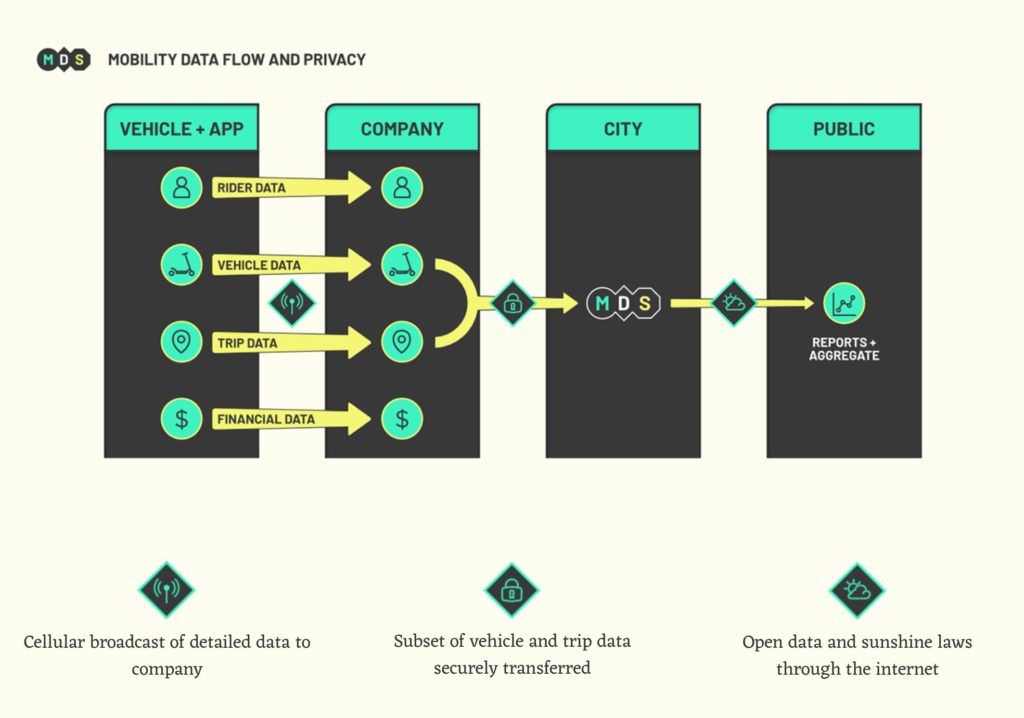Stewards of Data
As emerging mobility services and technologies transform cities’ transportation networks, the public policy goals of local governments remain consistent: cities want transportation systems that are safe, equitable, efficient, accessible, and sustainable. Data about mobility services operating on public streets helps cities achieve these goals.
The Mobility Data Specification (MDS) is a framework for using data to manage the public right-of-way. Cities who adopt MDS are able to manage shared mobility program operations, dynamically administer regulatory policies, conduct planning analyses, and more.
From managing public health records to enforcing compliance with regulations, data stewardship has long been a core function of city government. But, mobility data exchanged through MDS is relatively new, and entails a unique set of privacy considerations.
What MDS Data Is (And Isn’t)
MDS data contains information about trips taken on shared mobility devices and information about each shared vehicle, such as its operation status, its location, and the operating company owner. Cities can also publish their mobility policies using MDS.
MDS data does not contain names, contact information, payment information, or a unique identification number for individual riders. Location data in MDS reflects the movements of vehicles on public rights of way, and MDS does not provide a mechanism for gathering rider location information via mobile apps or phone location. Despite this, research has shown that data about the location and movement can sometimes be linked to other datasets in a way that reveals the identity of an individual.

Cities that use MDS can manage potential privacy risks while preserving their ability to proactively manage the public right-of-way, enforce rules for mobility providers, assess permit fees, and ensure the safety, equity, and sustainability of their transportation system.
Building on the Best
Cities don’t need to reinvent the wheel when it comes to privacy and mobility data.
To help address privacy considerations, The Open Mobility Foundation’s Privacy, Security, and Transparency Committee created a guide for cities. Building on the best practices and policies of cities using MDS, the Privacy Guide for Cities offers a starting point to develop appropriate standards, make policy decisions, and implement new mobility programs with data privacy and security well-protected.
Each city’s approach to privacy will be tailored to its use cases for MDS data, types of data processed, and applicable laws and regulations will vary across localities. But, our goal is consistent: to equip cities who use MDS with resources that support the responsible handling of mobility data, protection of individual privacy, and transparency to the public.
What’s Inside
Think of the guide as a planning tool to be used while developing a mobility program – a roadmap to the topics you’ll want to consider as part of this work, and a repository of best practices. Specifically, the guide includes detailed information about MDS implementation, risk management, and data sharing.
Implementation and planning is centered around the identification of specific use cases – detailed descriptions of what your city will use MDS data for – and reviews of internal readiness and applicable laws and regulations. The section on implementation and planning covers:
- Identifying Your Use Cases
- Reviewing Applicable Laws and Regulations
- Assesses Your Readiness
- Considering a Mobility Data Solution Provider
- Providing for Transparency
The guide also discusses common practices that organizations use to manage risk, as well as implementation tips. The section on managing risk covers topics including:
- Data Minimization
- Data Retention
- Access Control
- Obfuscation and Aggregation
- Working with Mobility Service Providers
City agencies share data with other parties for a variety of purposes as part of their public mission. For example, some agencies may share mobility data internally or with partner organizations to work on shared policy issues, to enable research partnerships, or to increase public transparency and accountability. The guide provides resources to ensure that MDS data is shared appropriately and responsibly, including:
- Sharing Through Open Data Portals
- Sharing with Mobility Data Solution Providers
- Sharing with Academic Institutions or Researchers
- Sharing with Other Agencies
- Disclosure Based on Public Records Requests
Download the guide and explore these topics in detail.
In the coming weeks, we’ll continue to dig into some of the resources in the guide, including how cities can plan for privacy and examples of how folks are already implementing these best practices.




